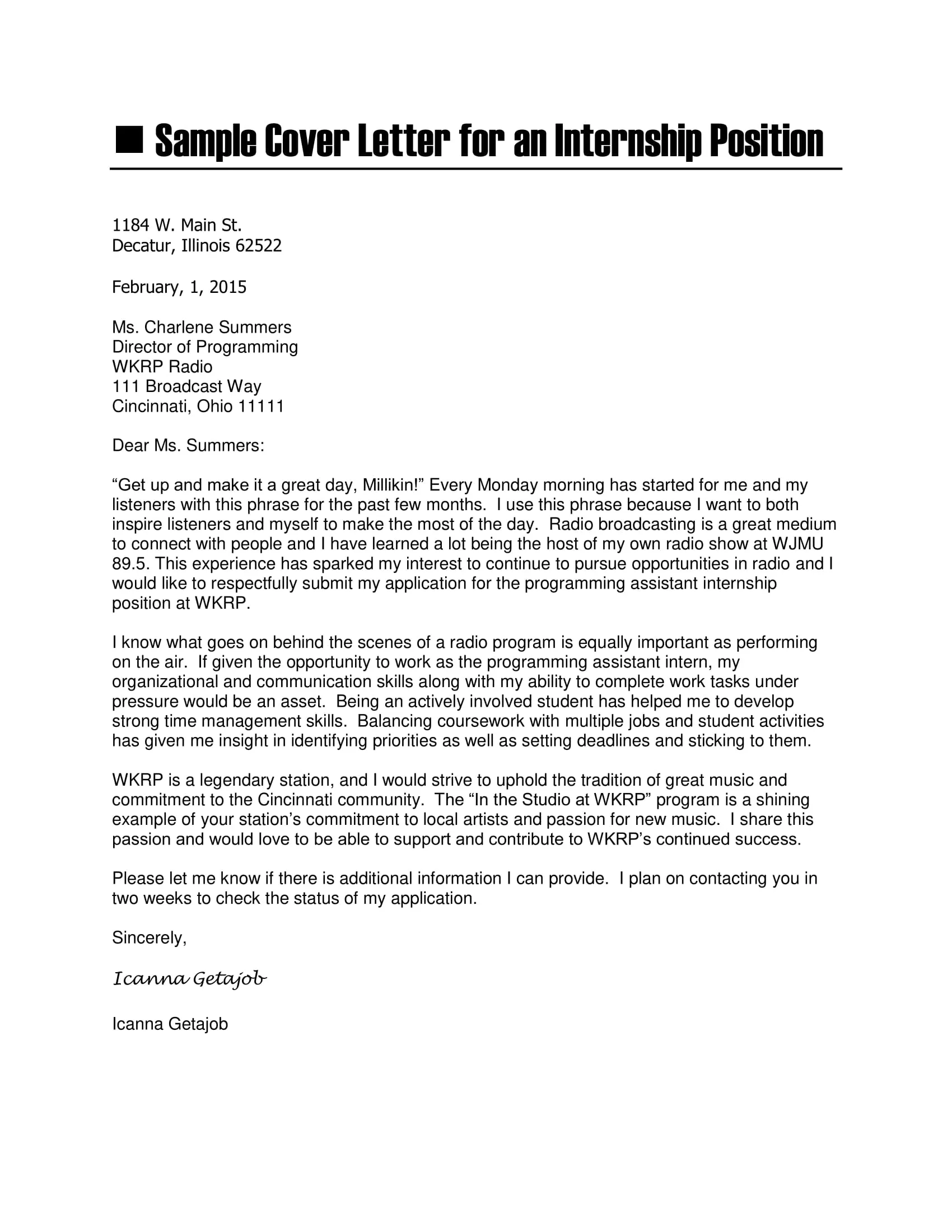What is an Internship Cover Letter
An internship cover letter is a crucial document that accompanies your resume when applying for an internship. It serves as an introduction, allowing you to showcase your interest in the specific opportunity, highlight your relevant skills and experiences, and explain why you’re a suitable candidate. Unlike a resume, which provides a summary of your qualifications, a cover letter allows you to tell a story, connecting your background to the requirements of the internship and demonstrating your enthusiasm for the role and the company. It’s an opportunity to make a strong first impression and persuade the hiring manager to consider your application.
Purpose of an Internship Cover Letter
The primary purpose of an internship cover letter is to convince the employer to read your resume. It acts as a bridge between your qualifications and the internship requirements. It provides context to your resume by elaborating on your skills, experiences, and motivations. Furthermore, it demonstrates your written communication skills and attention to detail. A well-crafted cover letter shows that you’ve researched the company, understand the internship’s goals, and are genuinely interested in contributing to the team. It’s a chance to make a personalized pitch, setting you apart from other applicants who might rely solely on their resumes.
Key Components of a Strong Cover Letter
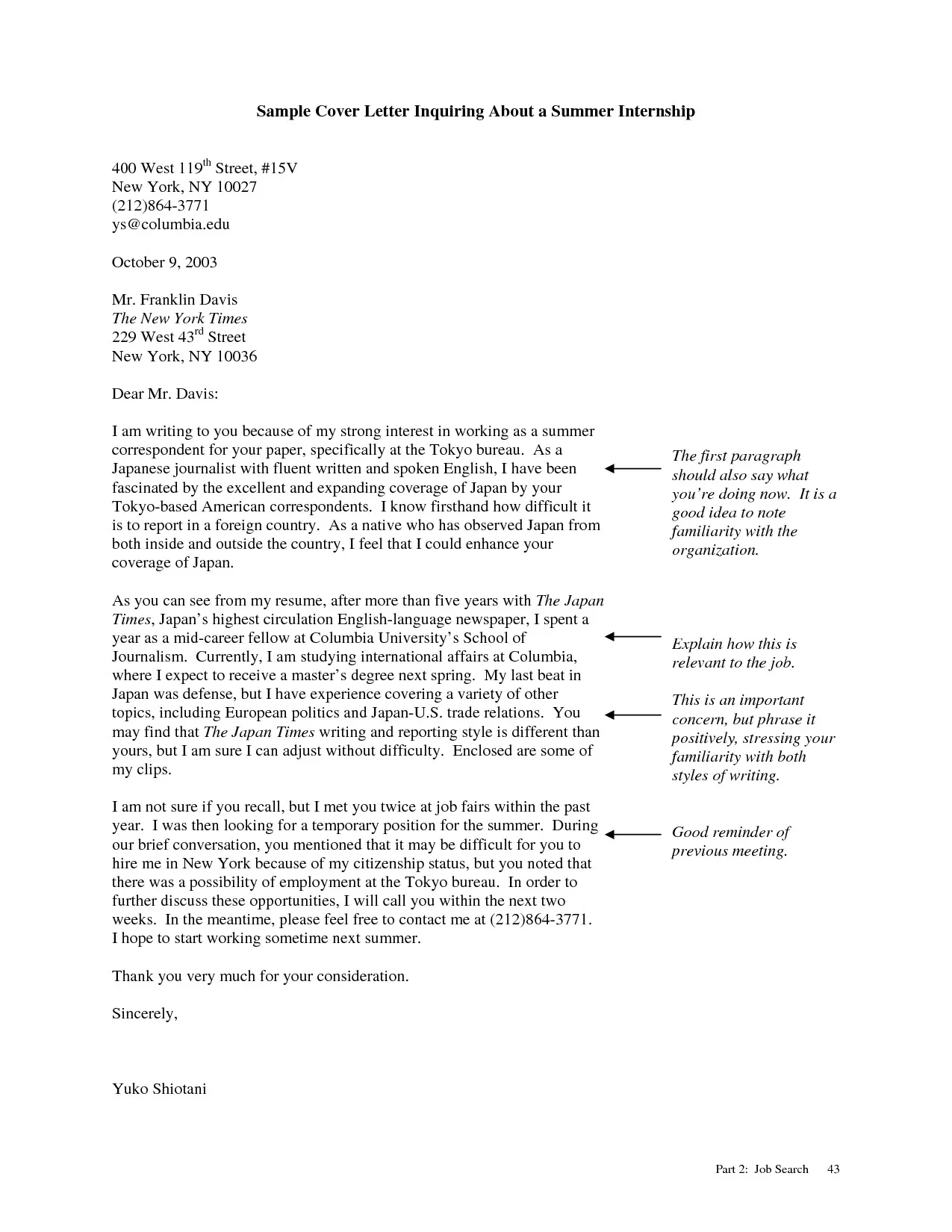
Header and Contact Information
The header of your cover letter should include your contact information, ensuring the employer can easily reach you. This typically includes your full name, phone number, email address, and optionally, your LinkedIn profile URL. The header should be professional and match the information on your resume. Ensure your email address is professional, avoiding nicknames or unprofessional phrasing. Properly formatting your header shows attention to detail and professionalism, creating a positive first impression with the hiring manager. Using a clean and readable font is essential.
Greeting and Recipient Information
Address the cover letter to the hiring manager or the specific person mentioned in the job posting. If a name isn’t provided, research the company to find the correct contact person. Using a specific name shows that you’ve taken the time to learn about the company and are interested in the opportunity. Start with a formal greeting such as “Dear Mr./Ms./Mx. [Last Name]” or “Dear Hiring Manager” if you can’t find a name. Avoid generic greetings like “To Whom It May Concern.” A personalized greeting sets the tone for a professional and engaging cover letter, demonstrating your respect for the recipient’s time and attention.
Body Paragraphs
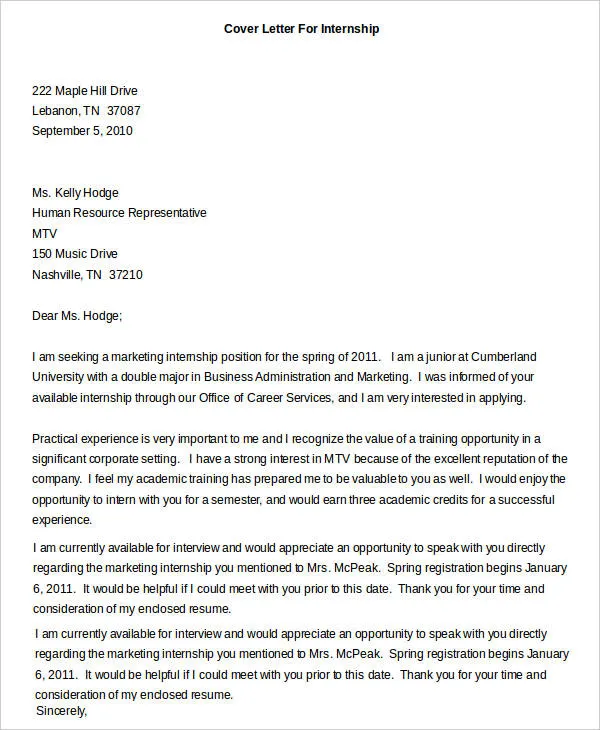
First Paragraph
The first paragraph should state the purpose of the letter, the position you’re applying for, and where you found the job posting. Express your enthusiasm for the opportunity and briefly mention why you’re interested in the company. It’s crucial to make a strong opening statement that captures the reader’s attention and clearly communicates your intent. Keep this paragraph concise and focused, highlighting your initial interest and setting the stage for the rest of your cover letter. This helps the recruiter to quickly understand the purpose of your application and gauge your initial interest in the role.
Second Paragraph
The second paragraph is where you highlight your most relevant skills and experiences. Explain how your qualifications align with the internship’s requirements. Use specific examples from your academic, volunteer, or work experiences to demonstrate your abilities. Quantify your accomplishments whenever possible, using numbers and data to showcase your impact. Tailor this paragraph to each specific internship application, emphasizing the skills and experiences that directly match the job description. This section is where you convince the hiring manager that you possess the capabilities needed to succeed in the role.
Third Paragraph
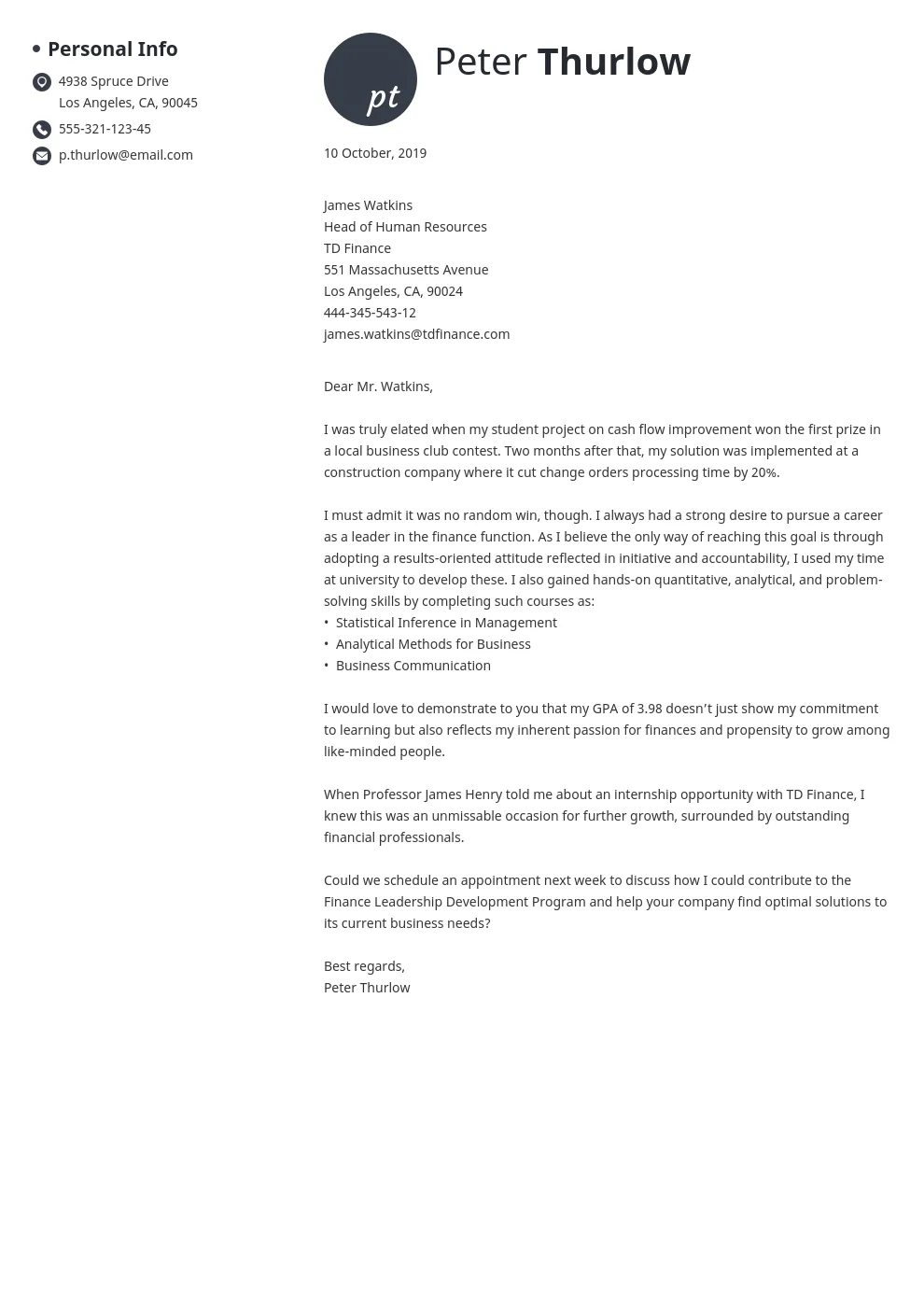
In the third paragraph, explain why you are interested in the company and what you hope to gain from the internship. Show that you have researched the company’s mission, values, and recent projects. Articulate how the internship aligns with your career goals. Discuss what you can contribute to the company. Demonstrate your understanding of the company culture and your enthusiasm for being a part of it. This paragraph demonstrates your genuine interest in the company and the internship, differentiating you from candidates who might be applying for any available position.
Closing and Call to Action
The closing paragraph should reiterate your interest and express your gratitude for the opportunity. Include a call to action, such as requesting an interview or expressing your willingness to discuss your qualifications further. Reiterate your contact information, and thank the reader for their time and consideration. End with a professional closing, such as “Sincerely” or “Best regards,” followed by your name. A strong closing leaves the reader with a positive impression and encourages them to take the next step in the hiring process.
Formatting and Design Tips
Font and Readability
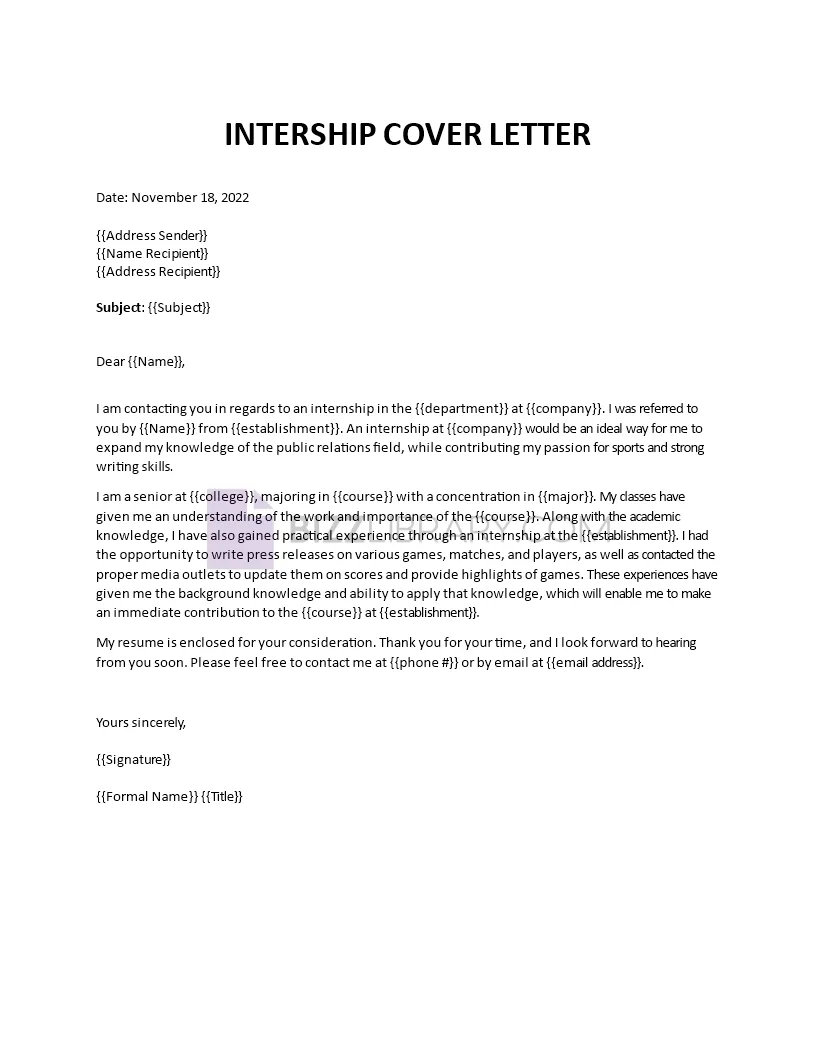
Choose a professional and easy-to-read font, such as Times New Roman, Arial, or Calibri, with a font size of 11 or 12 points. Ensure your cover letter is visually appealing, with clear and concise formatting. Use single spacing within paragraphs and double spacing between paragraphs. Employ bullet points to highlight key skills or accomplishments. The overall goal is to make your cover letter easy to read and understand, allowing the hiring manager to quickly grasp your qualifications and interest in the internship. Avoid overly decorative fonts that might distract from the content.
Length and Structure
Keep your cover letter concise, ideally one page in length. Structure your letter with clear paragraphs and headings to improve readability. Use a professional tone and avoid lengthy sentences or overly complex language. Each paragraph should focus on a specific idea or point. A well-structured cover letter demonstrates your ability to communicate effectively and concisely. Keep the content focused on relevant qualifications and experiences. Brevity and clarity are key to making a strong impression.
Proofreading and Editing
Thoroughly proofread your cover letter for any grammatical errors, typos, or formatting inconsistencies. Errors can undermine your credibility and make you appear unprofessional. Carefully review your writing for clarity and conciseness. Consider having a friend, career counselor, or family member review your letter for feedback. Proofreading ensures that your cover letter is polished, professional, and presents you in the best possible light. Pay close attention to detail, as this reflects your overall professionalism and attention to detail.
Cover Letter Samples & Examples
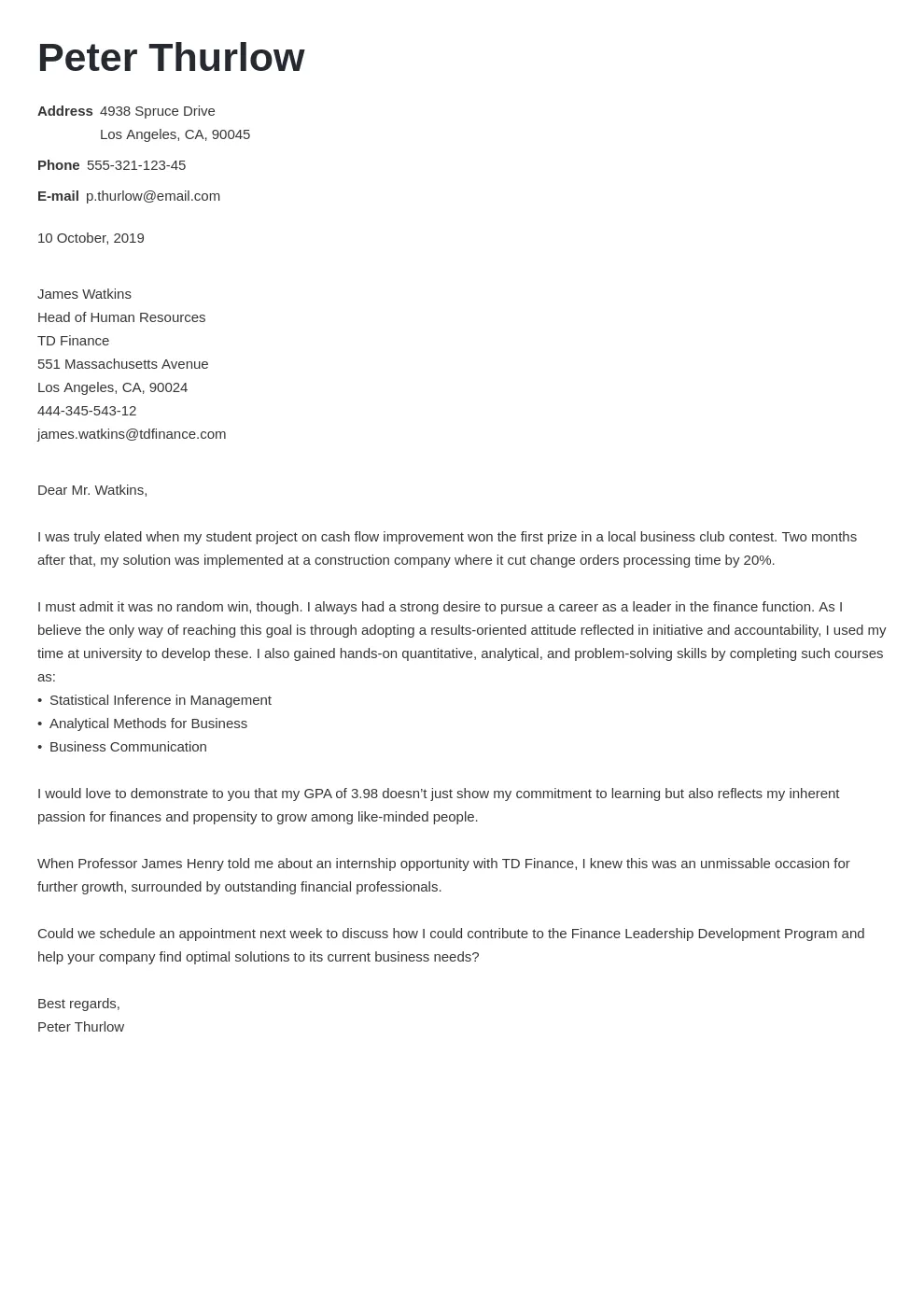
Cover Letter Sample 1
A sample cover letter would begin with your contact information, followed by the hiring manager’s information. Then, the greeting, body paragraphs highlighting skills and experiences and showing your interest in the company. Conclude with a call to action and your closing remarks. This sample would provide a template for applicants to follow, adapting it to their unique qualifications and the specific internship. This type of example is typically concise, focusing on key elements such as qualifications, enthusiasm for the role, and your ability to make a strong impression.
Cover Letter Sample 2
Another sample cover letter might showcase an applicant with technical skills, focusing on their proficiency in software programs or programming languages. The body paragraphs will emphasize their accomplishments in previous projects or academic achievements that align with the internship requirements. This sample would demonstrate how to effectively highlight technical skills to impress the hiring manager. The format should clearly outline relevant projects, experiences, and accomplishments that highlight the applicant’s technical expertise and abilities.
Cover Letter Sample 3
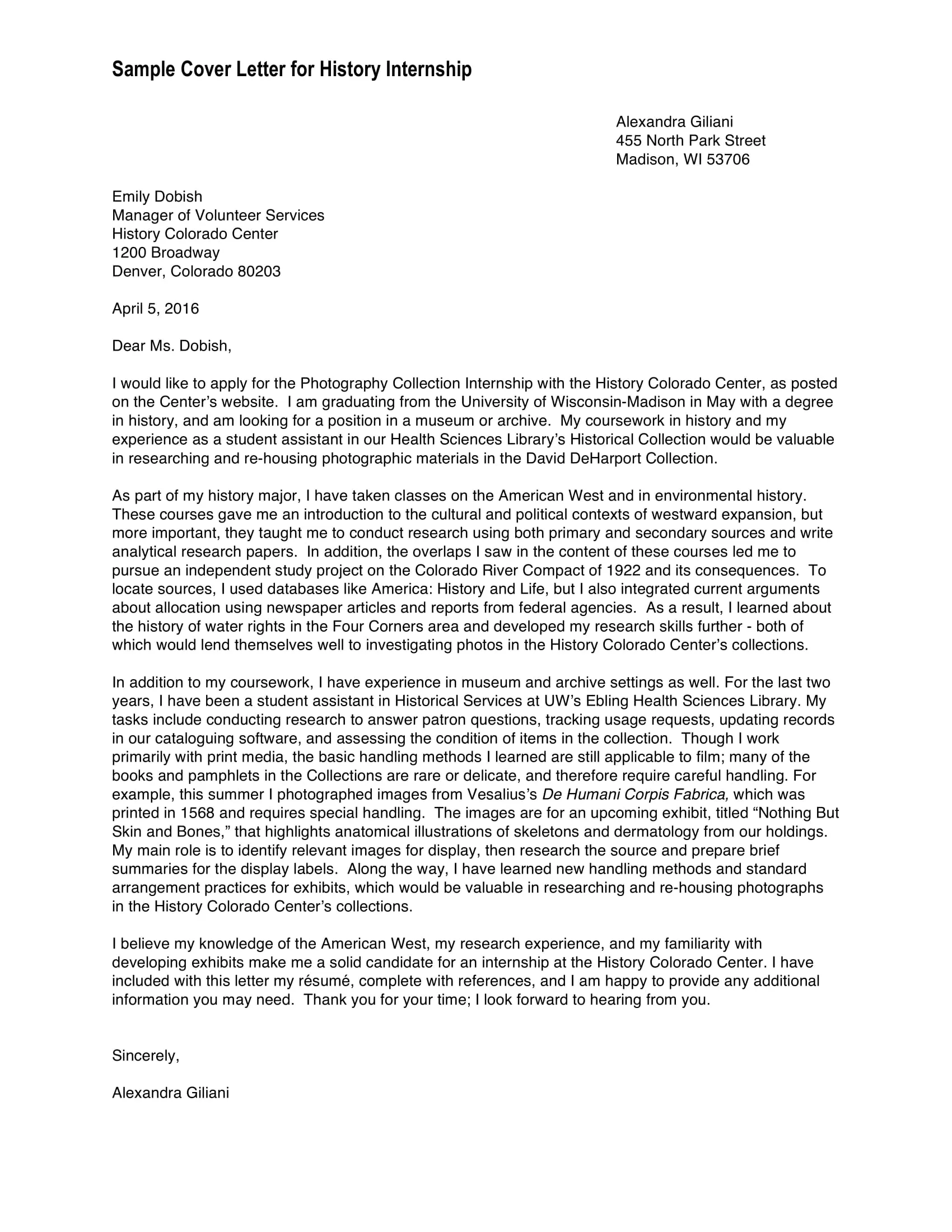
This sample might cater to a marketing or communications internship, with the applicant showcasing their skills in writing, social media management, and content creation. It would highlight the candidate’s experience with campaigns, content strategy, and marketing metrics. It would show how to demonstrate marketing skills and their ability to contribute to the company. The emphasis is on strong communication, creative skills, and the applicant’s passion for the marketing field, tailored to the needs of the internship.
Common Mistakes to Avoid
Generic Content
Avoid using a generic cover letter that could be sent to any company. Tailor your letter to each specific internship and company by researching the organization, mentioning its mission, values, and recent projects. Demonstrate genuine interest and showcase relevant skills and experiences that align with the internship requirements. Generic content indicates a lack of effort and interest. Customizing your letter shows that you have taken the time to understand the role and company.
Typos and Grammatical Errors
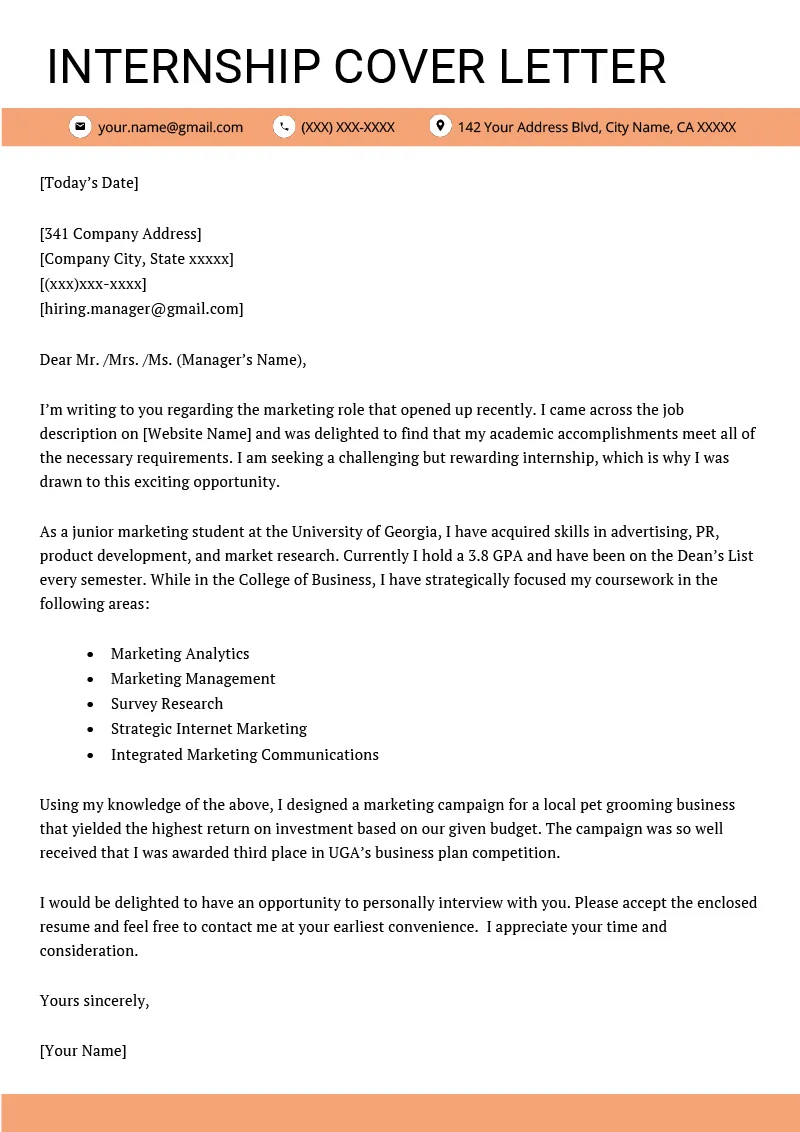
Carelessly written cover letters are a major red flag. Proofread carefully for typos, grammatical errors, and formatting inconsistencies. These errors reflect a lack of attention to detail and can undermine your credibility. Always have a friend or career counselor review your cover letter for feedback. A polished and error-free cover letter demonstrates your professionalism and commitment to the application process.
Lack of Personalization
Ensure you personalize your cover letter. Address the hiring manager by name, and tailor the content to the specific internship. Do not use a generic greeting like “To Whom It May Concern.” Show that you have researched the company and understand the internship requirements. Lack of personalization shows a lack of interest. Customization demonstrates that you’ve invested time and effort to make a strong impression. Personalized letters increase your chances of getting noticed.
Tailoring Your Cover Letter
Researching the Company
Before writing your cover letter, research the company and the specific internship. Visit their website, read their mission statement, and learn about their products, services, and recent projects. This research helps you tailor your letter to demonstrate your genuine interest and show how your skills and experiences align with the company’s goals. Understanding the company shows your commitment and makes your application stand out from others. Mention specific details or projects to show you have taken the time to understand the company.
Highlighting Relevant Skills
Carefully review the job description and identify the skills and experiences the employer is seeking. Then, highlight your relevant qualifications in your cover letter, providing specific examples of how you’ve demonstrated those skills in the past. Use action verbs to describe your accomplishments. Demonstrate how your skills align with the internship requirements to make it clear that you can contribute. Tailor your letter to the specific skills needed, making it easier for the hiring manager to see your value as a candidate.
Matching the Job Description
Carefully review the job description and tailor your cover letter to match the specific requirements of the internship. Use the same keywords and phrases the employer uses to describe the role and the desired qualifications. Align your skills and experiences with the requirements outlined in the job description. Demonstrate that you understand what the employer is seeking. Adapting your letter to match the job description increases your chances of getting your application reviewed, and helps to convey your suitability for the internship.
Final Thoughts
Crafting a perfect internship cover letter takes time and effort, but it is essential for making a strong first impression and landing an interview. By following these guidelines and tailoring your letter to each opportunity, you can showcase your skills, experiences, and enthusiasm. Remember to research the company, highlight relevant skills, and demonstrate your genuine interest in the internship. A well-crafted cover letter is a valuable tool in your job search, and it significantly increases your chances of securing an internship and advancing your career. Good luck with your applications!
